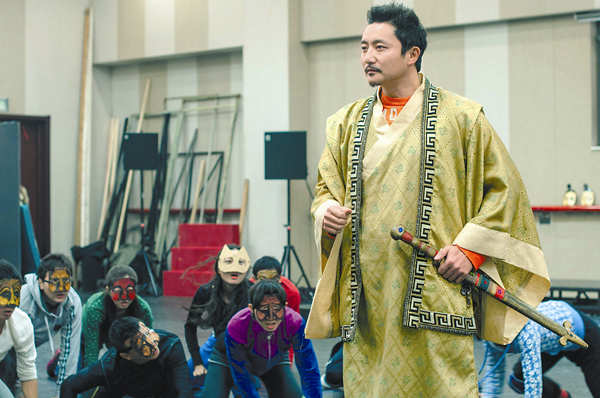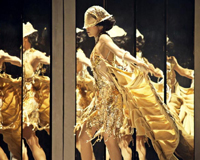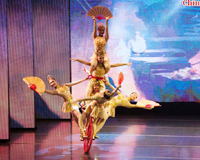

Performers rehearse the National Theater of China's new drama Fu Sheng in Beijing. Photo provided to China Daily
A revived play salutes a Qin Dynasty hero who saved Confucian texts for future generations. Han Bingbin follows the dramatic tension.
For its final show of 2013, the National Theater of China has decided to put on some cultural attitude. They picked up a script from 10 years ago that pays tribute to an almost forgotten historical hero, Fu Sheng. The Confucian scholar saved one of the Five Classics, Shang Shu, while risking his own life, from a burning campaign that the first emperor (Qin Shihuang) of the Qin Dynasty (221-206 BC) launched to eliminate dissent.
During Qin Shihuang's reign, some officials questioned his policies and advocated systems of previous dynasties that were recorded in Confucian classics. As a result, in 213 BC the emperor ordered that all historical records except the Qin records be burned. In the following year, more than 400 Confucian scholars were buried alive for libel after they scolded the emperor.
Practically nothing good was remembered of this time of misfortune except the heroic spirit of Fu Sheng. A descendant of two loyal Confucius disciples and once highly valued as an official historian by Qin Shihuang, Fu hid Shang Shu in a wall, making it among the rare historical classics to escape the fire. A collection of historical documents compiled by Confucius himself, Shang Shu is known as China's oldest historical record.
"The play is more than a story and legend," director Wang Xiaoying says. "Inheriting culture is a life experience."
Wang has directed plays about historical figures like Xiang Yu (232-202 BC), overlord in the West Chu period, and Richard III. But the rethinking of history or culture is hardly the attractive part for him. Instead, he's respected for relating the personal struggles of individuals, those who are put in extreme situations and have hard choices to make.
In Fu Sheng, therefore, history is slightly altered to create such dramatic tension. Instead of hiding Shang Shu in the wall, Fu memorized the whole book without telling anyone else, a method highly dependent on his talent but much safer, he thinks. It is an overly confident and seemingly thoughtless move that later blurred the line between selflessness and selfishness. When protecting his own life (and the treasured text in his head) becomes the top priority, he has to, in an agony of remorse, ignore the lives of his beloved ones.
Fu's son, also an advocate of Confucian thought, broke with his father after Fu surprisingly offered to burn down all the family's Confucian collections. Later when the son was hunted down by the soldiers, Fu turned him in because sheltering a criminal would cost the whole family's lives. Confused and irritated by her husband, Fu's wife killed herself by bashing her head against the wall. His daughter became a stranger.
Wang delivers the climax during a dialogue between Fu and his old rival, prime minister Li Si, when Li was on his way to execution upon the collapse of the Qin Dynasty. Fu revealed his secret by reciting a long excerpt from Shang Shu. With his trembling voice, the respect for history and the pride of culture becomes even more touching when they're mixed with guilt, remorse or whatever emotions the listeners think there may be.
Fu's feelings are further complicated by a little irony in the end. The following Western Han Dynasty (206 BC-24 AD) paid supreme tribute to Confucianism while banning all other schools of thought.
"Culture is as diversified as life. It's not right to respect only one school of thought in a specific time. So this is not what Fu Sheng wanted to see in the end," Wang says.
The whole historical drama is narrated in a very modern spirit. The sense of history is conveyed by a stage designed like an archaeological site with bamboo slips and fragments of bones scattered around. In the book-burning scene, the fire is represented by a big piece of red cloth that falls from the sky. All the supporting roles are played by the "singing team" wearing different identity-suggesting masks. In addition to speaking lines, they also dance and sing to externalize the characters' feelings.
For example, after Fu's son is taken away by the soldiers, Fu kneels on the floor and constantly shakes his head in agony, suggesting one of the fortes of director Wang - seeking inspiration from Peking Opera.
With these artistic experiments, the riveting story and the cultural attitude, Wang admits that it's a play of ambition.
"I want it to be a play of weight, a play that will last through time," he says.
If you go:
7:30 pm, Dec 25-29, Jan 25.
National Theater of China, 277 Guang’anmenwai Dajie (Street), Xicheng district, Beijing.
4006101101.
We recommend:
|
 |
 |
 |
| Karen Mok shows jazz variation at concert tour | National Acrobatic Troupe gives New Year performance | Fashion fur summer |

Discover Beijing
